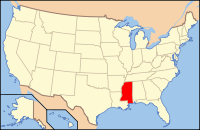Copiah County, MS
| Copiah County, Mississippi | |
|---|---|
 Location in the U.S. state of Mississippi |
|
 Mississippi's location in the U.S. |
|
| Founded | 1823 |
| Seat | Hazlehurst |
| Largest city | Crystal Springs |
| Area | |
| • Total | 779 sq mi (2,018 km2) |
| • Land | 777 sq mi (2,012 km2) |
| • Water | 2.2 sq mi (6 km2), 0.36\% |
| Population | |
| • (2010) | 29,449 |
| • Density | 38/sq mi (15/km²) |
| Congressional district | 2nd |
| Time zone | Central: UTC-6/-5 |
| Website | www |
Copiah County is a county located in the U.S. state of Mississippi. As of the 2010 census, the population was 29,449. The county seat is Hazlehurst.
With an eastern border formed by the Pearl River, Copiah County is part of the Jackson, MS Metropolitan Statistical Area.
Copiah, from a Choctaw Indian word meaning calling panther, was organized in 1823 as Mississippi's 18th county. In the year of county organization, Walter Leake served as governor and James Monroe as President of the United States. In 2004 Calling Panther Lake, commemorating this name, was opened up just West and North of Crystal Springs near the Jack and New Zion community.
Soon after the Choctaw Indians relinquished their claims to this land in 1819 and the legislature formed Copiah County in 1823, Elisha Lott, a Methodist minister who had worked among the Indians, brought his family from Hancock County to a location near the present site of Crystal Springs. When the New Orleans, Jackson and Great Northern Railroad built in the area in 1858, a new town was created about a mile and a half west of the old settlement. The new settlement took the name Crystal Springs and the old settlement became Old Crystal Springs.
William J. Willing's home was the first to be built in the new town, and Jefferson Davis, president of the Confederacy, once made a speech from the front yard. Ozious Osborne owned the first merchandise store on a corner of his residence lot on south Jackson Street. This lot later became the Merchants Grocery Company's site.
...
Wikipedia
